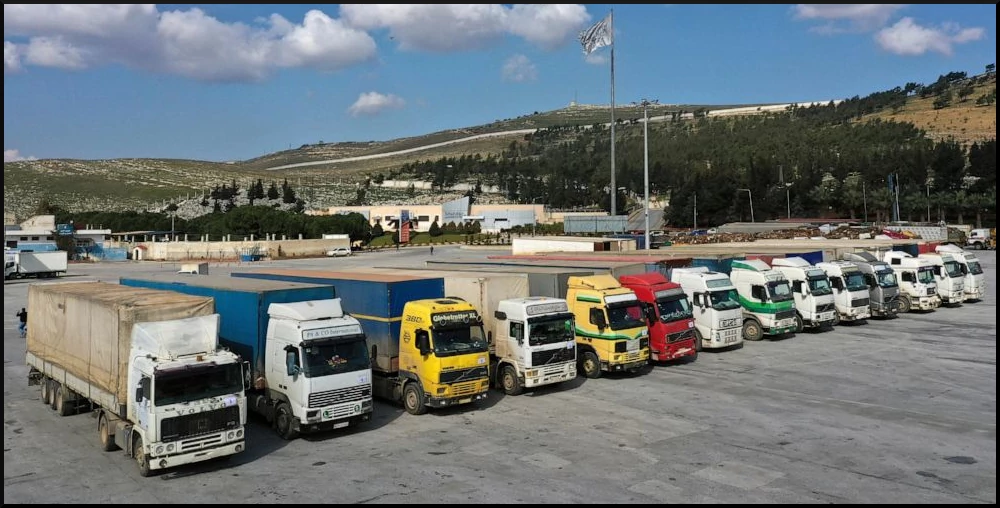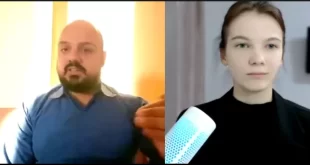On Tuesday, the spokesperson for the U.N. Office for the Coordination of Humanitarian Affairs announced that Syria has granted an extension for the United Nations to continue delivering humanitarian aid through two Turkish border crossings. This permission will be in effect until the 13th of November. Meanwhile, in a separate development, the head of the pharmacies syndicate in Damascus reported that the Syrian government has opted to raise drug prices by 50%. This decision comes as the Syrian pound experiences a new low in its value over the past few days. (What else could they do?)
Displaced Syrians fear hunger one month after UN failure to renew lifeline aid route
Residents of a camp for internally displaced people (IDP) in rebel-held northwestern Syria have expressed fears over worsening living conditions after the UN failed to renew a cross-border mechanism to allow international aid to reach the area, Al-Araby Al-Jadeed reported.
Some of the camp’s residents told The New Arab’s Arabic-language sister site Al-Araby Al-Jadeed that the UN was responsible for their plight.
A UN resolution allowed aid to cross via the Bab Al-Hawa crossing expired almost a month ago and camp residents feel there is no solution in sight.
They also blamed the Syrian regime, which they said had forced them into displacement and aid dependency. (This is a hostile information source. Apparently, they don’t see the U.S. backed terrorist war and the sanctions as the cause of these problems).
More than four million people live in rebel-held areas of northern and northwestern Syria, many of them in overcrowded camps where they are in desperate need of aid. (Apparently this is not the responsibility of Hayat al Tahrir and the Turkish backed terrorist who actually govern this area.)
“In the past, I used to work in agriculture. We never faced hunger,” said Mohammed Al-Omari, who currently lives in Idleb province’s Mashhad Ruhin camp.
Al-Omari said his family fled to northwestern Idleb in 2019 when they left the destroyed city of Maarat Al-Numan, which fell to regime forces that year.
“We ended up in the Mashhad Ruhin camp after selling everything we had just to be able to live without needing anyone’s help,” he said.
“The reality of the displaced in the Mashhad Ruhin camp is extremely dire,” he said. “We are six siblings, and each of my brothers has at least four children.” “There are no job opportunities at all. Sometimes we work as day labourers, but the daily wages do not exceed 50 Turkish lira, which only covers the cost of a loaf of bread,” he said. “In the past, we received some aid from humanitarian organizations, but after aid stopped, the situation became catastrophic.”
Last month, the UN Security Council failed to reach a consensus on extending the key aid route. Russia vetoed a nine-month extension and then failed to muster enough votes to adopt a six-month extension.
Following the 6 February earthquakes that struck both Turkey and Syria, the Assad regime agreed to temporarily open two other crossings on the border until 13 August. But several international organizations have expressed concern that allowing the regime control over the flow of aid to rebel-held areas could limit access to those most in need.
Syrians deported by Turkey to northern Syria face harsh realities
In recent times, Turkey has been forcibly deporting Syrian refugees from its territory back to northern Syria, particularly in areas such as Tal Abyad and Sere Kaniye. This deportation campaign is causing those who were once refugees in Turkey to face harsh realities in these regions, North Press reported.
Sumer al-Ibrahim, a 30-year-old refugee, was forcibly deported from Turkey along with hundreds of others. Arriving in Tal Abyad, north of Raqqa, he found himself in a difficult situation, as the Turkish authorities placed them in an unfamiliar area. The deportees were left without shelter or provisions, sleeping in gardens, mosques, and on roads. They were essentially stranded, isolated from other opposition-controlled areas by Syrian government forces and the Syrian Democratic Forces (SDF), with the Turkish-Syrian border to the north.
With the lack of resources and options, many deportees turned to smugglers affiliated with factions of the Turkish-backed Syrian National Army (SNA) to help them escape to other regions, such as Idleb and Aleppo countryside. These smugglers exploited the situation, demanding high sums of money for safe passage. The risks involved in these smuggling attempts were significant, as demonstrated by a failed attempt involving a landmine explosion and subsequent gunfire.
Despite the challenges and risks, some managed to make it to their desired destinations. Amjad al-Hussein, who was deported to Tel Abyad from Turkey, paid a substantial sum to smugglers to reach Aleppo countryside. He and others in his group were fortunate to successfully navigate the journey, which involved coordination with both SNA-affiliated smugglers and Syrian government forces.
The stories of those forcibly deported from Turkey underscore the challenges and complexities faced by Syrian refugees, even after they return to their homeland. The combination of forced deportations, limited resources, and the exploitation of vulnerability by smugglers has created a dire situation for these individuals, highlighting the need for international attention and assistance to address their plight.
Syria extends UN aid deliveries via two Turkish crossings until Nov. 13
Syria has extended its permission for the United Nations to deliver humanitarian aid via two Turkish border crossings until 13 November, the U.N. Office for the Coordination of Humanitarian Affairs spokesperson said on Tuesday. “We greatly welcome the extension of permission by the Government of Syria to utilise the Bab al-Salam and Al Ra’ee border crossings until November 13th,” Eri Kaneko told Reuters.
After an earthquake killed more than 50,000 people in Turkey and Syria in February, Syria allowed the United Nations to use those two border crossings from Turkey to dispatch aid. The approval was due to expire on 13 August.
The United Nations had also been using the Bab al-Hawa crossing from Turkey to deliver aid to millions in northwest Syria since 2014 with authorisation from the U.N. Security Council. But that expired in mid-July after the 15-member body could not reach an agreement to extend it. ( a month ago)
Just days later the Syrian regime said the United Nations could continue using the Bab al-Hawa crossing for another six months, but those aid deliveries are yet to resume because the U.N. has concerns with “two unacceptable conditions.” (hmmmm, wonder what those conditions are?)
The same conditions have not been imposed on the U.N. use of the Bab al-Salam and Al Ra’ee border crossings. (so 2/3 crossings are open?)
Medical Charity Slams UN Failure to Renew Syria Aid Route
A medical charity on Tuesday deplored the UN’s failure to renew a cross-border mechanism that allowed international aid to reach opposition-held northwestern Syria from Türkiye and demanded an urgent solution, Barrons reported.
“The resolution expired a month ago and there is no solution currently in sight. This is simply deplorable,” said Sebastien Gay, head of mission for Doctors Without Borders (MSF) in Syria, AFP reported.
The UN Security Council’s inability to renew “a resolution safeguarding access to vital humanitarian aid for northwestern Syria is inexcusable,” the aid group said.
More than four million people live in opposition-held areas of northern and northwestern Syria, many of them in overcrowded camps, where they are in desperate need of aid. (not just Idlib, but also the areas occupied by the United States and governed by their proxy SDF forces)
Through an arrangement that began in 2014, the UN delivered relief to the areas directly through the Bab al-Hawa crossing from Türkiye.
But last month, the UN Security Council failed to reach a consensus on extending the key aid route.
Russia vetoed a nine-month extension and then failed to muster enough votes to adopt a six-month extension.
“Humanitarian aid has been used as a tool in a political dispute and struggling people in northwestern Syria will pay the price for this failure,” Gay(?) said.
The Syrian government has said it will allow humanitarian aid to pass through the crossing for another six months but set conditions the UN called “unacceptable”.
Syria’s pharmacies syndicate says drug prices to increase 50% as the country’s pound hits a new low
The Syrian government decided to increase prices of drugs by 50%, the head of the pharmacies syndicate in Damascus said Tuesday, as the Syrian pound hit new a low in recent days, Associated Press reported.
Hassan Derwan did not give a reason for the price hike in his interview with the pro-government daily Al-Watan. Earlier this year, prices were raised by between 50% and 80%.
Syrian pharmaceutical companies mainly import raw materials in hard currencies which makes them susceptible to changes in the price of the Syrian pound. The companies have recently demanded to increase the price of their products to cope with the tumbling pound.
Since Syria’s conflict erupted 12 years ago — killing nearly half a million people and displacing about 6.8 million others — the country’s currency has lost much of its value and now the vast majority of Syrians live in poverty.
Back in 2011, a dollar was valued at 47 pounds. Last week, the dollar was valued at about 13,000 pounds on the parallel market while the official rate stood at 9,900. At the start of the year, the dollar was worth about 7,000 pounds.
The minimum monthly wage in Syria is 130,000 pounds or about $12 (mostly due to US Caesar sanctions).
The ‘forgotten’ camps where Syria war displaced languish
AFP published a long report on thousands of Syrians displaced who are living in dire conditions within unofficial camps in the Kurdish-held northeast of Syria. (specifically, occupied by the United States) These camps are characterized by extreme poverty and lack of international aid, leaving the residents in a state of neglect and desperation. Many of these informal settlements lack basic services and proper hygiene facilities, leading to recurrent illnesses among the inhabitants, especially children.
Rahma al-Hammud, a 33-year-old widow and mother of four, resides in the Al-Yunani camp in Raqqa province, which was once an area controlled by the Islamic State group. Conditions in such informal camps are often worse than in recognized displacement camps. People endure extreme temperatures, carrying heavy water buckets from communal tanks, while children play in unsanitary conditions. These informal camps have little organization and lack humanitarian assistance, making life even more difficult for those already displaced by conflict.
Only a limited number of camps, approximately 16, housing around 150,000 people, have official recognition and access to international aid. The majority of informal settlements are not recognized by international organizations, leaving residents to struggle without proper support. Tanya Evans of the International Rescue Committee referred to these informal camps as the “forgotten camps” of Syria, emphasizing the need for increased attention and resources from the international community.
The United Nations Office for the Coordination of Humanitarian Affairs (OCHA) reported that 79 percent of settlements in Raqqa province are informal. (In 2014, ISIS occupied Raqqa, since then, the US razed most of Raqqa to the ground, and continues to occupy much of the surrounding area) Despite efforts by local Kurdish authorities to transfer residents from informal to formal camps to improve living conditions, progress remains limited. The suspension of a UN cross-border mechanism in 2020, which had allowed aid to enter northeast Syria from neighbouring Iraq, further exacerbated the challenges faced by those in need. (According to international law, an occupying country must maintain the welfare of the residents of an occupied area – in this case, the United States)
The residents of these camps, who rely on scavenging for their main source of income, live in a state of despair and hopelessness, having lost faith in the prospect of improvements. With many enduring conditions that are often worse than the conflict itself, the inhabitants of these forgotten camps continue to face significant hardships without proper aid o
Emphasis and parenthetical comments by SSM Editor
 Syria Support Movement solidarity with the Syrian people
Syria Support Movement solidarity with the Syrian people





